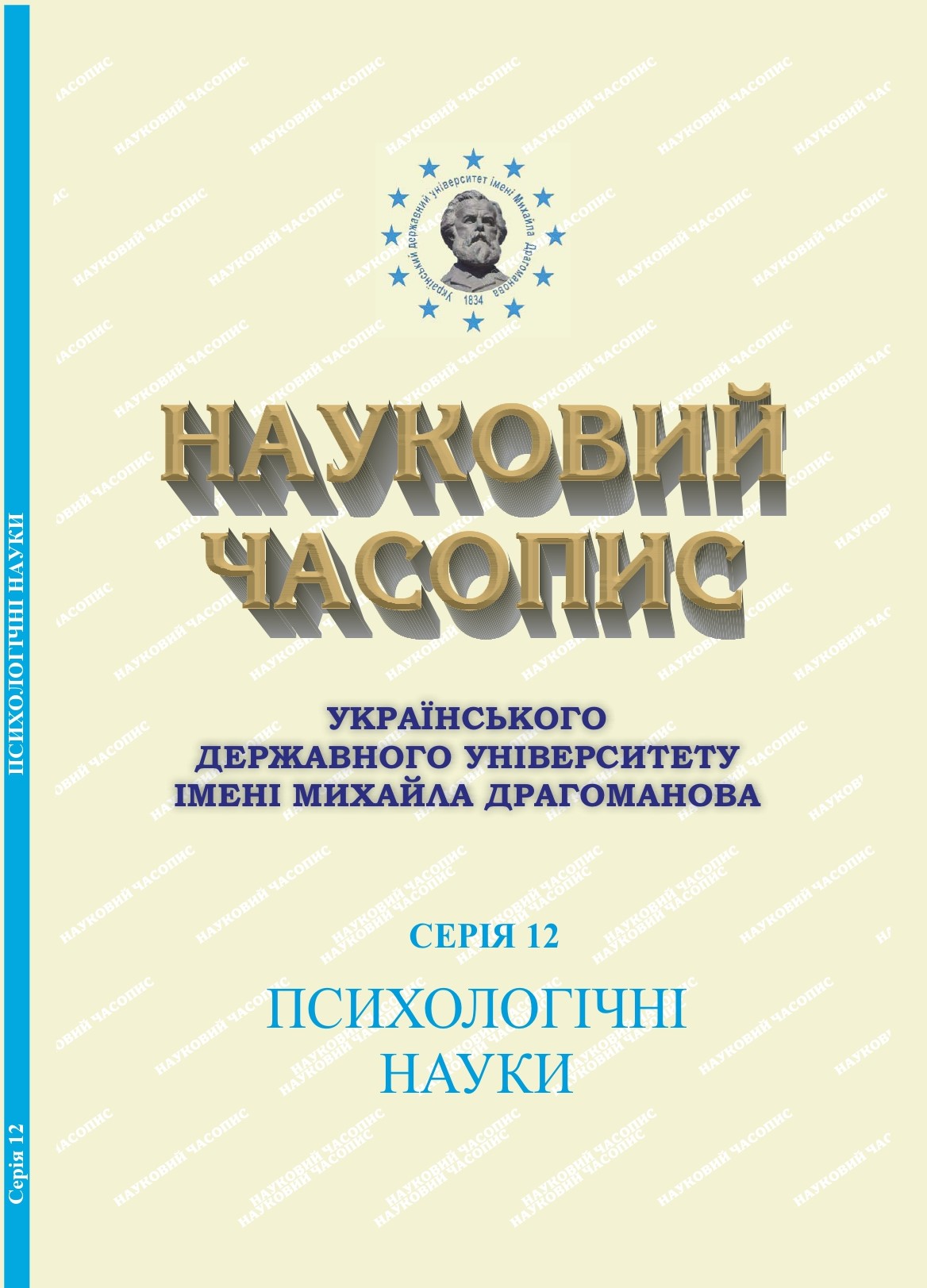CORRELATION OF CHARACTERISTICS OF PERSONALITY'S COPING BEHAVIOR WITH MANIFESTATIONS OF SYMPTOMS OF ITS TRAUMATIC EXPERIENCE
DOI:
https://doi.org/10.31392/UDU-nc.series12.2024.24(69).02Keywords:
stress, trauma, traumatization, traumatic experience, coping strategies, personality.Abstract
The article is focused on the study of the peculiarities of coping behavior of individuals with traumatic experience acquired as a result of experiencing psycho-traumatic situations of various severity and intensity in the conditions of a full-scale war. Theoretical (analysis and generalization of existing research on the problems of traumatic stress and coping), empirical (diagnostic methods) and mathematical statistics methods were applied to achieve the goal and tasks. Modern views on the concepts of trauma, psychotrauma and coping behavior (overcoming behavior) are considered. The peculiarities of individual behavior in a traumatic situation are analyzed. A significant number of links between the characteristics of coping behavior and the severity of the respondents' traumatic experience are determined. The relationship between personality coping styles with the acquired traumatic experience and its manifestations such as intrusion, avoidance, and excitability has been established. Individuals with a dominant task-oriented, “problem-solving” (problem-oriented strategy) coping style have been found to be less likely to experience subjective anxiety as a result of an acute event and show less avoidance. Conversely, individuals who rely more on emotion-oriented coping show higher symptoms of intrusion, avoidance, and excitability. The use of avoidance and distraction strategies, which are aimed at temporarily reducing the strength of stress, is ineffective and does not give the expected result when intrusion and excitability dominate as symptoms of a traumatic experience. It has been proven that coping styles are focused on solving tasks, perform a protective role and are associated with a decrease of anxiety in stressful situations, and coping styles focused on emotions are associated with greater reactions to anxiety, activating symptoms of intrusion, avoidance and excitability. Thus, problem-oriented strategies are a constructive and effective method of overcoming stress factors, while emotionally oriented coping strategies can be an ineffective coping mechanism and contribute to greater personal traumatization in stressful situations.
References
- Herman, Dzh. (2019). Psykholohichna travma ta shliakh do vyduzhannia: naslidky nasylstva – vid znushchan u simi do politychnoho teroru [Psychological trauma and the path to recovery: the consequences of violence - from domestic abuse to political terror]. (O.A. Nakonechna, O.V. Shlapak, Trans.). Lviv : Vydavnytstvo Staroho Leva [in Ukrainian].
- Klymchuk, V.O. (2020). Psykholohiia posttravmatychnoho zrostannia [Psychology of post-traumatic growth]. Natsionalna akademiia pedahohichnykh nauk Ukrainy, Instytut sotsialnoi ta politychnoi psykholohii – National Academy of Pedagogical Sciences of Ukraine, Institute of Social and Political Psychology. Kropyvnytskyi : Imeks-LTD [in Ukrainian].
- Kuzmenko, Yu. (2022). Psykholohichni osoblyvosti stanu ta naslidkiv dlia osib, shcho perezhyly vtratu blyzkykh yim liudei pid chas viiny [Psychological features of the condition and consequences for persons who experienced the loss of loved ones during the war]. Naukovyi visnyk Vinnytskoi akademii bezperervnoi osvity. Seriia «Pedahohika. Psykholohiia» - Scientific bulletin of the Vinnytsia Academy of Continuing Education. Series "Pedagogy. Psychology", 1, 28–33. DOI: https://doi.org/10.32782/academ-ped.psyh-2022-1.05 [in Ukrainian].
- Olefir, V.O. (2011). Vzaiemozviazok zhyttiestiikosti, dopinh-stratehii ta psykholohichnoho blahopoluchchia [The relationship between resilience, coping strategies and psychological well-being]. Visnyk Kharkivskoho natsionalnoho universytetu imeni V. N. Karazina/ Seriia : Psykholohiia - Bulletin of Kharkiv National University named after V. N. Karazin. Series: Psychology, 981(47), 168–172. http://nbuv.gov.ua/UJRN/VKhIPC_2011_981_47_38 [in Ukrainian].
- Rodina, V. (2013). Psykholohiia kopinh-povedinky: systemne modeliuvannia [Psychology of coping behavior: systematic modeling]. (Doctor’s thesis). Kyivskyi natsionalnyi universytet imeni Tarasa Shevchenka, Kyiv. Retrieved from https://dspace.onu.edu.ua/handle/123456789/10689 [in Ukrainian].
- Tytarenko, T. M. (2020). Landshafty osobystisnykh transformatsii unaslidok travmatychnoho voiennoho dosvidu [Landscapes of personal transformations as a result of traumatic war experience]. Ukrainskyi psykholohichnyi zhurnal-Ukrainian Psychological Journal, 1(13), 209–222. [in Ukrainian].
- Asch, R.H, Esterlis,, Southwick, S.M., & Pietrzak, R.H. (2021). Risk and resilience factors associated with traumatic loss-related PTSD in US military veterans: Results from the National Health and Resilience in Veterans Study. Psychiatry Research, Vol. 298, 113-775. DOI: 10.1016/j.psychres.2021.113775
- Bonanno, G.A. (2012). Uses and abuses of the resilience construct: loss, trauma, and health-related adversities. Social Science and Medicine, 74(5), 753–756. https://doi.org/1016/j.socscimed.2011.11.022
- Endler, N.S., & Parker, J.D. (1990). Multidimensional assessment of coping: A critical evaluation. Journal of Personality and Social Psychology, 58(5), 844–854. https://doi.org/10.1037/0022-3514.58.5.844
- Fortes-Ferreira, L, Peiró, J.M., González-Morales, M.G., & Martín, I. (2006). Work-related stress and well-being: the roles of direct action coping and palliative coping. Scand J Psychol, 47(4). 293-302. https://doi.org/1111/j.1467-9450.2006.00519.x
- Herman, J. (1992). Trauma and Recovery. The aftermath of violence – from domestic abuse to political terror . New York : Harper Collins.
- Lazarus, R. S., & Folkman, S. (1984). Stress, appraisal, and coping. Springer Publishing Company.
- Shakespeare-Finch, J., Gow, K., & Smith, S. (2005). Personality, Coping and Posttraumatic Growth in Emergency Ambulance Personnel. Traumatology, 11(4), 325–334. DOI: 1528/trau.2005.11.4.325

